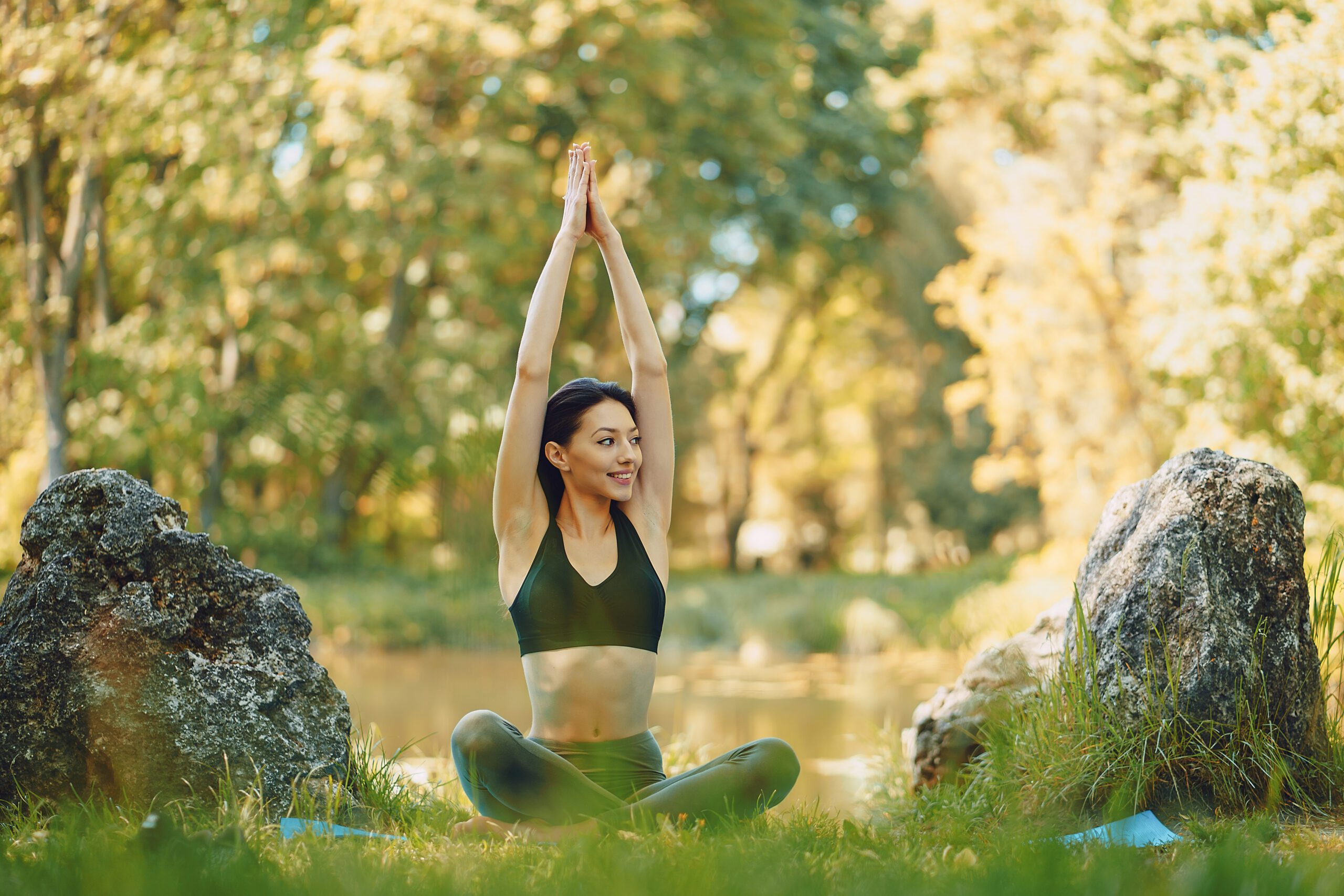Yoga has long been recognized for its benefits to mental health, offering a holistic approach to managing stress, anxiety, depression, and overall mental well-being.
Yoga is a holistic practice that originated in ancient India and has been practiced for thousands of years. It encompasses physical postures (asanas), breathing techniques (pranayama), meditation (dhyana), and ethical disciplines.
Yoga aims to create a balance between mind, body, and spirit, promoting overall health and well-being.
Types of Yoga
The Types Of Yoga are discussed below:
| Type of Yoga | Key Characteristics | Benefits |
|---|---|---|
| Hatha Yoga | Focuses on physical postures (asanas) and breath control (pranayama). | Improves flexibility, strength, and relaxation. Great for beginners. |
| Vinyasa Yoga | Involves a sequence of poses that flow smoothly, synchronized with breath. | Boosts mood, increases energy levels, and enhances cardiovascular fitness. |
| Ashtanga Yoga | A rigorous and structured style following a specific sequence of postures. | Builds strength, flexibility, and stamina. Improves discipline and mental focus. |
| Iyengar Yoga | Emphasizes precision and alignment, often using props like blocks and straps. | Improves posture, alignment, and overall body awareness. Accessible for all levels. |
| Bikram Yoga | Practiced in a heated room with a set sequence of 26 poses. | Enhances detoxification, flexibility, and strength. |
| Yin Yoga | Involves holding poses for an extended period to target deep connective tissues. | Promotes relaxation, increases flexibility, and enhances mindfulness. |
| Restorative Yoga | Uses props to support the body in poses, allowing for deep relaxation. | Reduces stress, calms the nervous system, and improves overall well-being. |
| Kundalini Yoga | Combines dynamic movements, breath control, and meditation to awaken energy. | Increases self-awareness, balances emotions, and enhances spiritual growth. |
| Power Yoga | A fitness-based approach focusing on building strength and stamina. | Improves physical fitness, endurance, and muscle tone. |
| Anusara Yoga | Focuses on alignment and heart-opening poses, integrating a spiritual component. | Enhances physical alignment, emotional resilience, and spiritual awareness. |
| Jivamukti Yoga | Integrates physical practice with ethical and spiritual teachings. | Promotes physical fitness, spiritual growth, and ethical living. |
| Sivananda Yoga | Based on a five-point philosophy: proper exercise, breathing, relaxation, diet, and meditation. | Encourages a balanced and healthy lifestyle, combining physical, mental, and spiritual practices. |
| Viniyoga | Tailors practice to individual needs, often therapeutic. | Personalizes practice for specific health issues, promoting healing and well-being. |
| Kripalu Yoga | Emphasizes self-awareness and compassion, combining physical and meditative practices. | Enhances self-awareness, emotional healing, and overall well-being. |
| Integral Yoga | Aims to integrate body, mind, and spirit through a balanced practice of asanas, pranayama, and meditation. | Promotes holistic well-being, combining physical health with spiritual growth. |
| Forrest Yoga | Emphasizes core strength, breath work, and emotional healing. | Builds strength, releases tension, and promotes emotional well-being. |
Best Yoga practices That Improve Your Mental Health

- Hatha Yoga
- Vinyasa Yoga
- Yin Yoga
- Restorative Yoga
- Kundalini Yoga
- Ashtanga Yoga
- Iyengar Yoga
- Pranayama
- Meditation and Mindfulness
Hatha Yoga
Hatha yoga focuses on physical postures and breathing exercises. It helps improve flexibility, strength, and relaxation.
Key Poses:
- Tree Pose (Vrikshasana)
- Warrior Pose (Virabhadrasana)
- Child’s Pose (Balasana)
Benefits:
- Promotes relaxation
- Reduces stress
- Enhances mental clarity
Vinyasa Yoga
Vinyasa yoga involves a sequence of poses that flow smoothly from one to the next, synchronized with breath.
Key Poses:
- Sun Salutations (Surya Namaskar)
- Downward Dog (Adho Mukha Svanasana)
- Plank Pose (Phalakasana)
Benefits:
- Boosts mood
- Increases energy levels
- Reduces anxiety.
Yin Yoga
Yin yoga involves holding poses for an extended period, targeting deep connective tissues and promoting stillness.
Key Poses:
- Butterfly Pose (Baddha Konasana)
- Dragon Pose (Anjaneyasana)
- Sphinx Pose (Salamba Bhujangasana)
Benefits:
- Enhances mindfulness
- Promotes inner calm
- Relieves stress
Restorative Yoga
Restorative yoga uses props to support the body in poses, allowing for deep relaxation and stress relief.
Key Poses:
- Supported Bridge Pose (Setu Bandhasana)
- Legs-Up-The-Wall Pose (Viparita Karani)
- Reclining Bound Angle Pose (Supta Baddha Konasana)
Benefits:
- Induces deep relaxation
- Calms the nervous system
- Alleviates anxiety and depression
Kundalini Yoga
Kundalini yoga combines dynamic movements, breath control, and meditation to awaken energy.
Key Practices:
- Breath of Fire (rapid, rhythmic breathing)
- Ego Eradicator (arms lifted and breathing technique)
- Kirtan Kriya (chanting meditation)
Benefits:
- Increases self-awareness
- Balances emotions
- Improves mental resilience
Ashtanga Yoga
Ashtanga yoga is a rigorous practice that follows a specific sequence of postures and is known for its physical and mental discipline.
Key Poses:
Primary Series (Yoga Chikitsa), which includes poses like Extended Triangle Pose (Utthita Trikonasana) and Seated Forward Bend (Paschimottanasana).
Benefits:
- Enhances Focus
- Builds Inner Strength
- Promotes Emotional Stability.
Iyengar Yoga
Iyengar yoga emphasizes precision and alignment in each pose, often using props.
Key Poses:
- Downward Dog (Adho Mukha Svanasana)
- Shoulder Stand (Sarvangasana)
- Extended Triangle Pose (Utthita Trikonasana).
Benefits:
- Improves Concentration
- Reduces Stress
- Enhances Overall well-being.
Pranayama (Breath Control)
Pranayama involves various breathing techniques that can be practiced alone or integrated into yoga sessions.
Key Techniques:
- Nadi Shodhana (Alternate Nostril Breathing)
- Bhramari (Bee Breath)
- Ujjayi (Victorious Breath)
Benefits:
- Calms the mind
- Reduces Anxiety
- Promotes Emotional Balance
Meditation and Mindfulness
Incorporating meditation and mindfulness practices into your yoga routine can greatly enhance mental health.
Key Practices:
- Mindfulness Meditation
- Loving-Kindness Meditation (Metta Bhavana)
- Body Scan Meditation.
Benefits:
- Reduces stress
- improves emotional regulation
- enhances overall mental clarity
Tips for Practicing Yoga for Mental Health
The tips for practicing yoga for mental health are:
- Consistency
- Environment
- Listen to your body
- Combine practices
Benefits of Yoga

The benefits of yoga are discussed below:
| Category | Benefit | Description |
|---|---|---|
| Physical Benefits | Improved Flexibility | Yoga stretches and lengthens muscles, enhancing overall flexibility. |
| Enhanced Strength | Many poses build muscle tone and strength. | |
| Better Posture | Awareness of body alignment helps in maintaining good posture. | |
| Improved Circulation | Poses and breathing exercises boost blood flow. | |
| Weight Management | Certain styles help burn calories and maintain a healthy weight. | |
| Increased Balance and Coordination | Balancing poses improve stability and coordination. | |
| Enhanced Respiratory Function | Breathing exercises strengthen the lungs and improve oxygen intake. | |
| Reduced Chronic Pain | Yoga can alleviate pain related to chronic conditions like arthritis. | |
| Boosted Immune System | Stress reduction and physical activity enhance immune function. | |
| Mental Benefits | Reduced Stress | Relaxation and mindfulness techniques lower stress levels. |
| Improved Mental Clarity | Focus and concentration are enhanced through yoga practice. | |
| Elevated Mood | Increases production of endorphins, the body’s natural mood lifters. | |
| Enhanced Self-Awareness | Promotes a deeper connection with oneself. | |
| Better Emotional Regulation | Helps manage emotions and reduces anxiety and depression. | |
| Improved Sleep Quality | Relaxation techniques and physical activity promote better sleep. | |
| Increased Cognitive Function | Enhances memory, attention, and cognitive processing. | |
| Greater Resilience to Stress | Builds mental resilience and the ability to handle stress more effectively. | |
| Spiritual Benefits | Inner Peace | Meditation and mindfulness practices lead to a sense of calm and inner peace. |
| Enhanced Self-Discipline | Regular practice fosters self-control and resilience. | |
| Sense of Connection | Encourages a connection with oneself and a broader sense of connection with the world. | |
| Heightened Awareness | Increases awareness of the present moment and mindfulness. | |
| Personal Growth | Promotes self-discovery and personal development. | |
| Spiritual Awakening | Some practices, like Kundalini yoga, aim to awaken spiritual energy. | |
| Cultivation of Compassion and Kindness | Encourages compassion towards oneself and others. | |
| Enhanced Sense of Purpose | Can lead to a deeper understanding of one’s life purpose and values. |
Conclusion
Incorporating yoga into your daily routine can significantly improve your mental health. Each style of yoga, from the foundational Hatha yoga to the deeply relaxing Restorative yoga, offers unique benefits that can help manage stress, reduce anxiety, and enhance overall well-being.
By engaging in these practices, you can cultivate a balanced state of mind, foster inner peace, and build resilience against the challenges of everyday life.
Whether you’re a beginner or an experienced practitioner, exploring these yoga practices can provide valuable tools for mental health maintenance and improvement.
Embrace the holistic benefits of yoga to nurture your mind, body, and spirit, leading to a more harmonious and fulfilling life.
Recommended blog :https://www.health.harvard.edu/staying-healthy/yoga-for-better-mental-health
Read More:https://yogayurvedaa.com/10-essential-yoga-asanas-one-should-try-daily/
